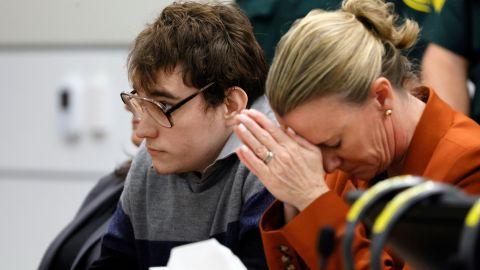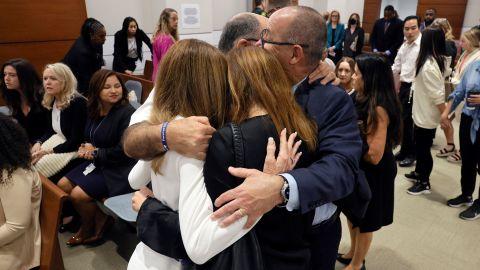Sara Weisfeldt, Jason Hanna, Elizabeth Wolfe, Leyla Santiago and Christina Maxouris
‘It got ugly.’ Jurors in Parkland school massacre case report feeling threatened, disrespected during tense deliberations
Sheriff’s office investigating juror’s threat allegation
Deliberations were ‘tense,’ a juror wrote in letter to judge
One of the three jurors in the Parkland school massacre case who was against the death penalty for Nikolas Cruz told CNN Friday she did not make her decision until the “very last minute.”
Ultimately, she was persuaded to vote for life without parole because she “felt that the system failed” Cruz repeatedly throughout his life, from the schools he attended to mental health professionals who evaluated him.
“I saw several pieces of evidence where several (experts had) recommended (Cruz) be in a residential facility. That never happened,” said Melody Vanoy, who was a juror in the case.
On Thursday, the jury kept Cruz from getting the death penalty, recommending life in prison without parole by default when it did not unanimously agree Cruz should get capital punishment for the 2018 South Florida killings. Some victims’ families were enraged by the decision, saying they felt the jury failed them.
Vanoy described a hostile environment which arose among the jurors – with whom she said had bonded during the monthslong trial – at the end of deliberations and after their paperwork was filled out.
“There were negative sarcastic remarks,” Vanoy said. “I heard comments like, ‘we’re going to let the families down.’”
“I felt disrespected, despite the relationships that we had built,” she added. “The energy was so heated that we wanted to get out of that room. They had to take us down for over 30 minutes to just give us fresh air so we can move around and separate. That’s how heated it got.”
“It got ugly,” Vanoy said.
Other jurors also described tension during deliberations, and in an interview, the jury foreman described disagreement among the panel, saying three of the 12 jurors opposed the death penalty in the case.
Cruz admitted to killing 14 students and three school staff members and injuring 17 others in the Valentine’s Day 2018 shooting at Marjory Stoneman Douglas High School in Parkland, Florida. Because Cruz pleaded guilty to all counts – 17 counts of murder and 17 counts of attempted murder – the trial phase was skipped and the court went directly to the sentencing phase.
The judge is expected to issue the gunman’s formal sentence on November 1 and by law is unable to deviate from the jury’s recommendation of life.
Sheriff’s office investigating juror’s threat allegation
While CNN interviewed Vanoy Friday afternoon, a court hearing was also taking place after prosecutors asked the judge to compel law enforcement officers to interview a juror who alleged she felt threatened and investigate if a crime was committed.
Broward Circuit Judge Elizabeth Scherer said she would not direct the sheriff’s office to investigate the allegation, but added, “if that’s a matter that they feel is appropriate for a criminal investigation, that’s what they should do.”
The Broward County Sheriff’s Office said Friday afternoon it received information from the state attorney’s office regarding the juror’s allegations and will now investigate.
Prosecutors in Friday’s hearing called the allegation a “safety issue.”
“Frankly, we don’t want to touch this with a ten-foot pole because we know that the defense will be jumping up and down and saying that we are trying to undermine the verdict, which we are not trying to do. The only reason we are doing this is that we cannot ignore a safety issue,” the prosecution said. The judge agreed.
The name of that juror was not made public. The juror called prosecutors Thursday after the jurors’ decision was read in court, according to a court filing obtained by CNN.
“Juror X spoke to a support staff member and informed the support staff member that during deliberations she received what she perceived to be a threat from a fellow juror while in the jury room,” the filing says. “The State did not call Juror X back and instead, filed a Notice to the Court.”
Deliberations were ‘tense,’ a juror wrote in letter to judge
On Thursday, another juror wrote a handwritten letter to the judge calling the deliberations “tense,” and saying some jurors became “extremely unhappy” when she mentioned she’d vote for life in prison.
In the letter, the juror also denied allegations she made up her mind to vote for life in prison before the trial began, saying she heard other jurors had made such accusations about her.
The juror who reported the perceived threat now being investigated is a different juror from the one who wrote the letter to the judge, according to Assistant State Attorney Carolyn McCann.
Of the 12 jurors, three voted against recommending the death sentence, jury foreman Benjamin Thomas told CNN affiliate WFOR, adding, “I don’t like how it turned out, but … that’s how the jury system works.”
“There was one with a hard ‘no’ – she couldn’t do it. And there was another two that ended up voting the same way,” Thomas said. The woman who was against it “didn’t believe, because he was mentally ill, he should get the death penalty,” Thomas said.
Vanoy also told CNN there were one woman on the jury panel who was “not moving” from her stance against the death penalty. “So whether we took 10 hours or five days (of deliberating), she didn’t feel she was going to be moved either way.”
To recommend death, the jury would have needed to unanimously agree aggravating factors – reasons the prosecution said he should be put to death – outweighed mitigating circumstances, or aspects of Cruz’s life and upbringing the defense said warranted only life in prison.
The jury did not unanimously agree on this, meaning Cruz must be sentenced to life in prison without possibility of parole.
During the sentencing trial, prosecutors argued any mitigating factors were overshadowed by what they described as Cruz’s exceptionally cruel and heinous acts. They presented detailed evidence to support their claims Cruz carefully planned and premeditated the attack. The prosecution rested their case after jurors toured the still bloodstained school building where the massacre happened.
Cruz’s attorneys paintedthe shooter as a severely “broken” person who suffers from a number of mental and developmental issues that were not adequately treated when he was growing up.

Nikolas Cruz sits next to his attorney, Assistant Public Defender Melisa McNeill, as the jury's recommendations are read in court.
Amy Beth Bennett/South Florida Sun-Sentinel/AP
‘Yet another gut punch’ for devastated families
Victims’ loved ones were overwhelmed with rage and disbelief after hearing the verdict, and many denounced the decision as inadequate punishment given the extraordinary losses they have suffered.
The 14 slain students were: Alyssa Alhadeff, 14; Martin Duque Anguiano, 14; Nicholas Dworet, 17; Jaime Guttenberg, 14; Luke Hoyer, 15; Cara Loughran, 14; Gina Montalto, 14; Joaquin Oliver, 17; Alaina Petty, 14; Meadow Pollack, 18; Helena Ramsay, 17; Alex Schachter, 14; Carmen Schentrup, 16; and Peter Wang, 15.
Geography teacher Scott Beigel, 35; wrestling coach Chris Hixon, 49; and assistant football coach Aaron Feis, 37, were also killed – each while running toward danger or trying to help students to safety.
Alyssa’s mother told CNN Friday she was shocked by how quickly the jury’s decision came – on the second day of deliberations.
“I just would have wanted the jurors to spend more time going through the evidence, really trying to convince … all 12 jurors that this animal should be getting the death penalty,” Lori Alhadeff said.
“They had time, and they really should have gone through the evidence. It almost makes me feel like that there was somebody that already had this notion … that they were never going to give the death penalty,” Alhadeff said.
Hixon’s widow, Debra Hixon, told CNN Thursday when she realized the killer wouldn’t receive the death penalty, she felt like she had been punched in the chest.
“What hurts the most is that there is a belief that any mitigating circumstances could outweigh what he did to our loved ones,” Hixon said, adding, “Because the way it comes out is that his life has more value than those that were murdered.”
Public defender Gordon Weekes urged the community to respect the jury’s decision.
“This day is not a day of celebration, but a day of solemn acknowledgment, and a solemn opportunity to reflect on the healing that is necessary for this community,” he told reporters.

Linda Beigel Schulman, Michael Schulman, Patricia Padauy Oliver and Fred Guttenberg, families of the victims, embrace in the courtroom before the verdict is read.
Amy Beth Bennett/South Florida Sun Sentinel/AP
But several families were insistent that the jury’s decision does not deliver them peace. The mother of Helena Ramsay, a 17-year-old senior, also denounced the jury’s recommendation.
“After spending months and months listening, and hearing testimonies, and looking at the murderer – his composure – I believe justice was not done,” Anne Ramsay said. “The wrong verdict was given out today.”
Correction: An earlier version of this story incorrectly reported Peter Wang’s age at the time of his death. He was 15.
CNN’s Matthew Hilk, Dakin Andone, Alta Spells, Elizabeth Joseph, Carlos Suarez, Ray Sanchez, Kevin Conlon, Aditi Sangal, Matt Meyer and Denise Royal contributed to this report.
